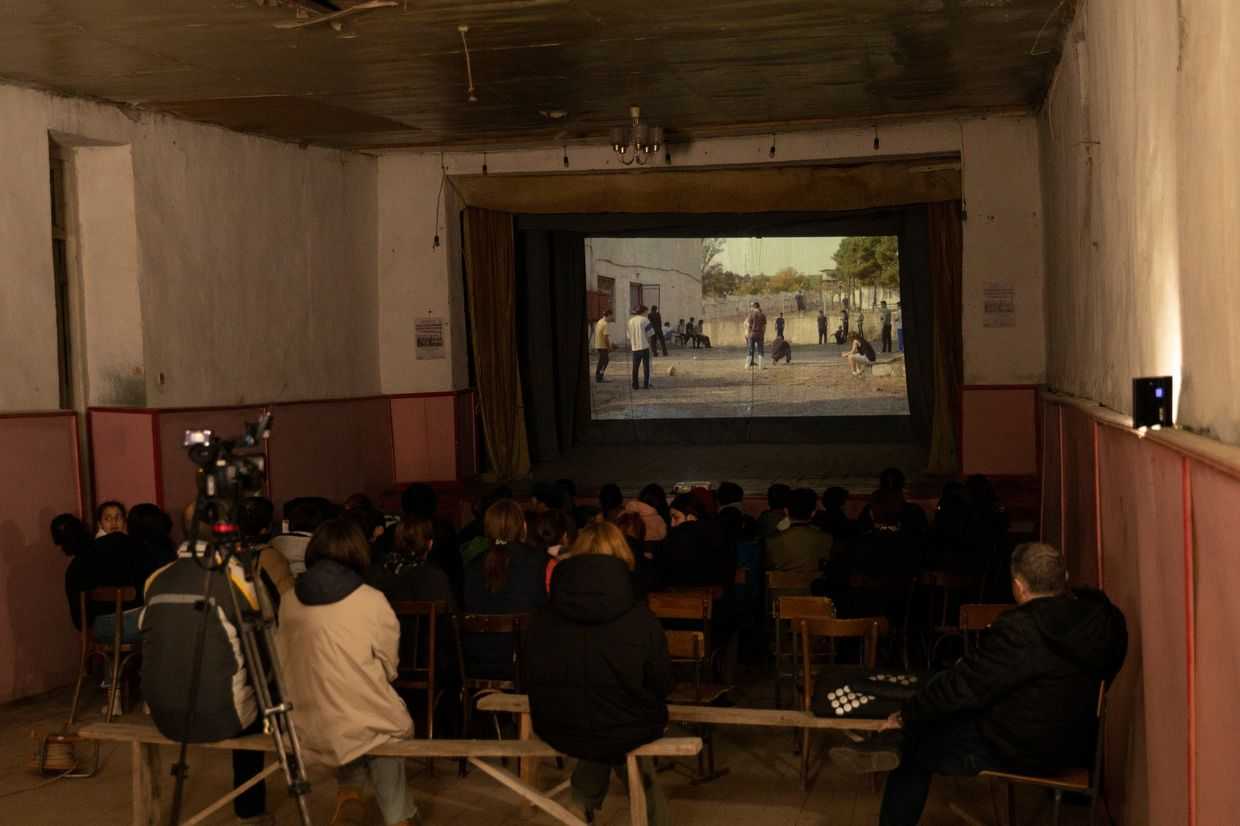

 Tbilisi City Hall has began a campaign to clear the streets of vendors selling clothes, books, fruits and vegetables, and various other things. They claim that they are a nuisance to pedestrians in the city’s busiest streets. Many of the vendors, however, claim that selling on the street is the only way they can survive.
Tbilisi City Hall has began a campaign to clear the streets of vendors selling clothes, books, fruits and vegetables, and various other things. They claim that they are a nuisance to pedestrians in the city’s busiest streets. Many of the vendors, however, claim that selling on the street is the only way they can survive.
For years Malvina, 67, has sold clothes on a small counter in front of Akhmeteli Metro Station, in one of Tbilisi’s suburbs. Malvina helps other street vendors to move their products at nights and in the mornings, but she complains that very often she does not make enough money to cover her daily food.
She started weeping as she told us how she got credit from the bank to have eye surgery, but it didn’t help, and now she has to pay her entire state pension to the bank.
‘I’ve had a number of surgeries on my eye, but they didn’t help. Now I don’t have one eye. If they will prohibit me from working here, I will die of hunger’, Malvina tells us.
Clearing one of Tbilisi’s busiest streets
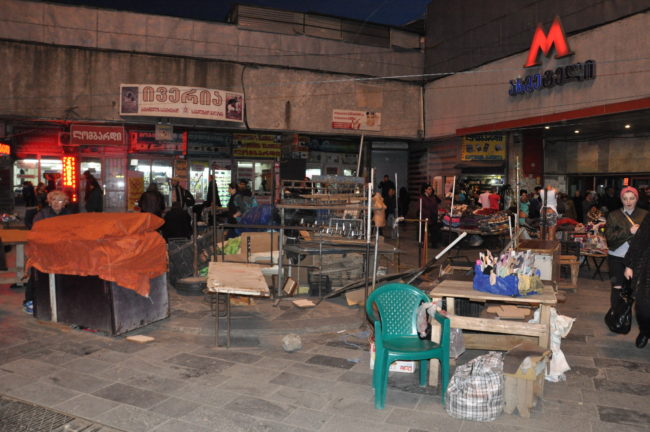
On 19 March, Tbilisi City Hall cleared the area around Marjanishvili Metro Station from street vendors. Employees of the City Hall removed counters and products of the vendors early in the morning without notifying them.
A week later, another cleanup was organized on Baratashvili Street and Orbeliani Square. City Hall dismantled illegal constructions of vendors and prohibited them from selling products in the street.
The local government stated that the process will continue periodically to free the streets from vendors.
Aghmashenebeli Street, where Marjanishvili Metro Station is located, is one of the most crowded streets in Tbilisi and a popular tourist destinations in the capital. The city government claims that the street vendors distort the view of the city and are a nuisance to pedestrians.
Now police patrol the area to stop the street vendors coming back to resume selling.
In a statement published on their website, City Hall claims that residents of the city had appealed to them numerous times to prohibit illegal street vendors. People complain about the inconvenience they cause.
‘Such measures will be taken occasionally in the future in different locations of the city. Recently we banned illegal activity of entrepreneurs on the area near the Vazha Pshavela statue as well’, the statement reads.
Street vendors complain that City Hall didn’t warn them in advance about possible cleanups. They didn’t manage to move their counters, which were taken away.
‘I struggle for money for bread every day’
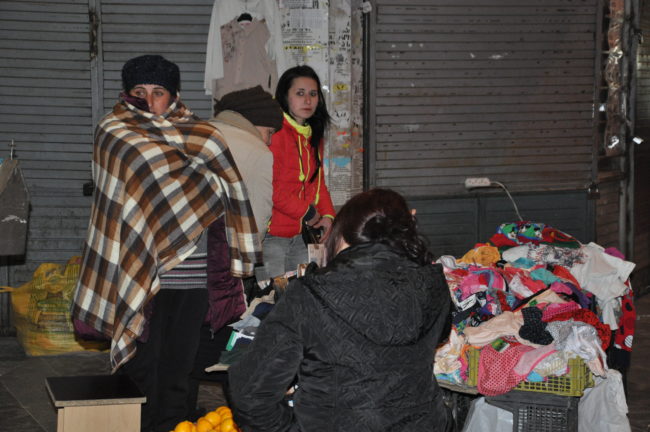
The area in front of Akhmeteli Theatre Station, where Malvina sells clothes, is one of the most crowded stations in Tbilisi and there are labyrinths of street vendors. Among the sellers are Georgians, Azerbaijanis, Roma people and Indians. There is street food, clothes, fruits and vegetables, books and newspapers, stationery, flowers and many other things available to buy.
It is the last stop on the metro line and there is always a big crowd coming out of the metro. It is hard for them to move and there’s always a blockage near the metro because of street vendors and the crowds of people. Vendors tell us that they don’t have many options, as most of them have loans that they need to pay, and they won’t get as much profit in other locations as in front of the metro station, where there are many people.
Malvina says that the majority of vendors are here because they are at a dead end. She thinks that if the government wants to solve this problem they shouldn’t just ban the street vendors, but allocate space for them to sell their products.
‘I have grandchildren in Russia. I haven’t seen them for three years. I cannot go there. I don’t have enough money. I’ve never seen them. I don’t even know how they look. This is not life. I struggle for money for bread every day, from morning until evening’, she tells OC Media.
‘If there were jobs, we would work’
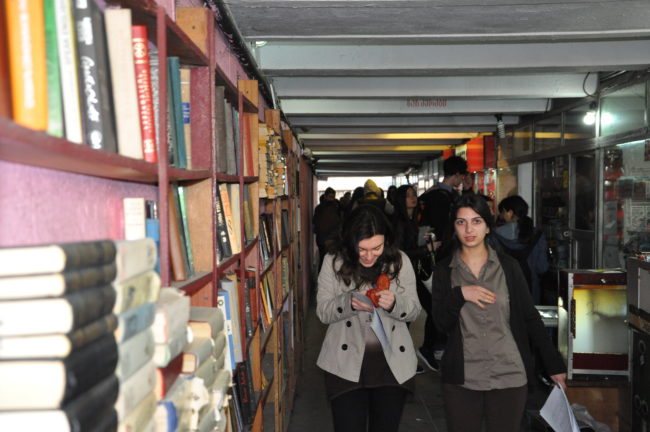
Natia Tsiklauri has worked in the same area for the last 15 years. She says that even if the government kicks them out, she will continue selling. She may not put products out on the counter, but she will stand in different spots and will try to continue work.
‘There are no normal spots in the marketplace. There are spaces only in the corners, where nobody comes. On the other hand, I have less products and if I rent a space there I will have to pay so much for a day, which I cannot earn from two days of selling’, she says.
Natia’s husband is also a street vendor. They weren’t able to find any other proper jobs. If the government bans both of them from selling, their children won’t have food anymore.
‘If there were opportunities to work, we could work in a factory or somewhere else to feed our family. If there were jobs, we would work. Who dreams of being a street vendor?’ she asks.
Lela, who has worked at Akhmeteli Station for five years, cannot remember cases when the government banned street vendors since 2012, when the ruling party changed. She says that if they will be prohibited to sell in the streets, they will organize mass protests, because there are families behind each street vendor.
‘We don’t get pleasure from being street vendors. Some of us are young, we want to go to the cinema, to have some fun, but if I skip a day here it means that we don’t have food that day’, she says, adding that after the recent case in Marjanishvili, people are scared that the city government will reach Akhmeteli as well.
‘We can’t just leave this place.’
Zoia Tedeeva unlike others moves from one place to another. She carries products with her. She used to sell lemons, now she sells women’s tights. She thinks that the government doesn’t try to eliminate core problems, and attempts to solve problems rapidly by banning street sellers.
‘Booksellers are a part of students’ lives’
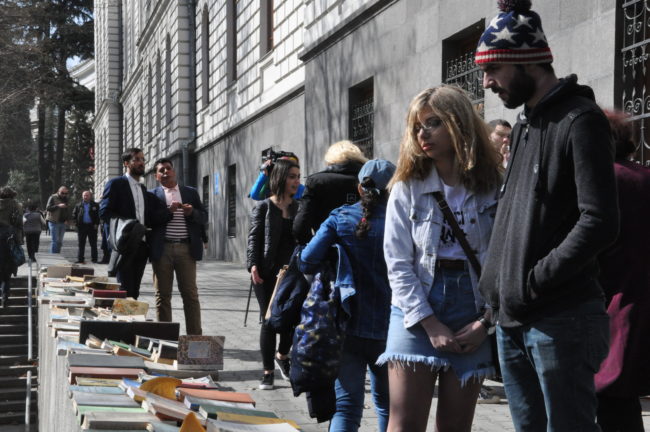
Booksellers also encountered problems from the city government last week. One bookseller, Valerian Tsirdava, who sells books in the underground pass near Tbilisi State University, told OC Media that employees of City Hall’s Supervisory Service came to him and gave him three days to vacate the area.
‘They told me that it is prohibited to sell products in the street. I am disabled. This is the only thing I know. I don’t know what else to do. Is this the only problem our city has? There are so many problems in this country. It would have been nice to solve them first ’, he says.
Student movement Auditorium 115 protested against the banning of booksellers from the streets. Levan Lortkipanidze, a member of the movement, says that employees of the Supervisory Service have approached most booksellers in the streets and warned them to leave their areas. The movement expressed solidarity with booksellers on 20 March.
‘Booksellers are a part of students’ lives. They help us get books cheaper than in shops. The City Hall’s decision is reckless’, Lortkipanidze says.
Irakli Kupradze, another student from Tbilisi State University, explained that their solidarity was with every bookseller in Tbilisi, as they usually provide students with rare books and they are important for the students.
Tristan Makhauri, a professor at the university, says that used books are relatively cheap in the streets.
‘I buy books really cheaply here. It is very important that booksellers remain here. If a person wants to study, they won’t make it without books. Booksellers need support. They will always have clients’, Makhauri remarks.
City Hall’s decades long struggle with street vendors
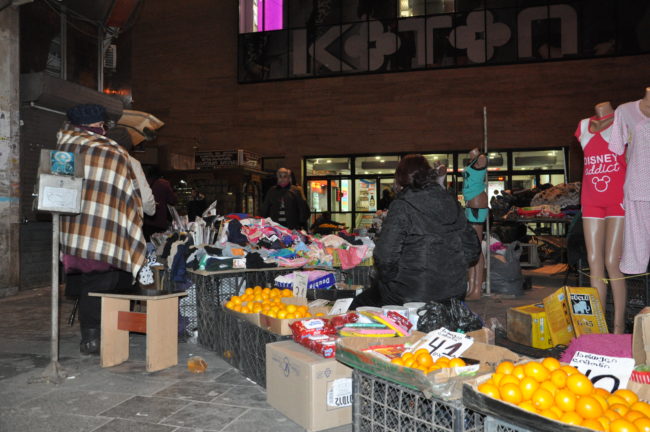
Georgia has faced challenges with street vendors for several decades. After the Rose Revolution in 2003, the issue became the subject of confrontation between people and the government many times. Police would clear the streets of sellers from different locations, but they kept coming back.
As well as clothes and toys, people also sell spoilable goods, which results in unsanitary conditions and dirty streets.
The City Hall states that they are mediating with the owners of several marketplaces to allocate space for the street vendors, and that they will be able to continue selling in other locations. They will be allocated spaces for free in the markets for the first six months.
Street vendors tell OC Media that they’ve tried to sell in marketplaces many times, but usually the available spaces are in the worst spots where no one comes, and it would make no sense to sell there.



